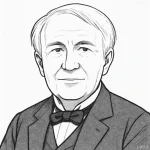“Youth is easily deceived because it is quick to hope.”

- 384 BC – 322 BC
- Originating from Macedonia in ancient Greece
- Philosopher and scientist, founder of the Lyceum academy
table of contents
Quote
“Youth is easily deceived because it is quick to hope.”
Explanation
In this quote, Aristotle points to a characteristic of youth: its tendency to be optimistic and eager for the future. Because young people are often full of hope and ambition, they can be more susceptible to deception or disappointment. Their hope can sometimes cloud their judgment, making them more likely to believe things that may not be true or to pursue ideals that may not align with reality. This trait, while full of potential, can also make youth vulnerable to manipulation or misguided decisions, as their desire for a better future can cause them to overlook practical considerations or the complexities of life.
This idea is still relevant today, particularly in how we view youthful optimism. In the modern world, young people are often driven by dreams of success, personal achievement, and social change. While this drive can lead to incredible innovations and personal growth, it can also lead to unrealistic expectations or the pursuit of goals without fully understanding the obstacles or risks involved. Social media and the pressure of success can amplify this tendency, where idealized images of life can cause young individuals to expect outcomes that do not always reflect the complexities of reality.
For example, a young person starting a new business or career may be full of hope and excitement, but without a realistic understanding of the hard work and setbacks involved, they may be easily disillusioned when things don’t go as planned. Similarly, in relationships or social endeavors, youthful idealism can lead to a sense of betrayal or disappointment when expectations are unmet. Aristotle’s quote serves as a reminder that hope and optimism are essential qualities but must be tempered with wisdom and experience to avoid the pitfalls of unrealistic expectations.
Would you like to share your impressions or related stories about this quote in the comments section?




